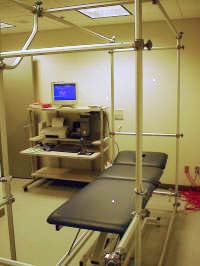Investigators: Leo H Wang MD PhD, Stephen Tapscott MD PhD
Category: Research - Clinical
Background and Justification
A major goal of the Seattle Wellstone Muscular Dystrophy Cooperative Research Center is to establish the clinical trials capabilities and infrastructure necessary to integrate the University of Washington and Seattle Children’s Hospital into national clinical trials networks for FSHD. The Wellstone Center has supported a bi-institutional study with the University of Rochester to establish common MRI imaging and clinical evaluation standards for FSHD research, and has extended this to a clinical study to determine the biological and biomarker correlates of MRI changes in FSHD. The success of these efforts has established Seattle as a center of FSHD clinical research.
As a result of successful development of the basic clinical infrastructure for FSHD clinical research, Seattle has been approached regarding the opportunity to enter national clinical trials networks for FSHD, however, these clinical networks require that each participating institution uses the same Quantitative Muscle Assessment (QMA) system for measuring muscle strength in study participants.
The Wellstone supported partnership with the University of Rochester has been very successful in initiating an FSHD clinical research program in Seattle. Dr. Tawil at the University of Rochester is preparing a U01 grant application to the NIH in response to the Clinical Trial Readiness for Rare Neurological and Neuromuscular Diseases call for applications.
Based on prior collaborations with various researchers in Seattle, Dr. Tawil is anxious to include Seattle as a component of the proposed FSHD Clinical Trials Network, however, muscle strength assessment using the QMA system is required to be a member of this consortium and to be included as a participating center on the U01 grant application. If Seattle establishes the QMA assessment system, Dr. Tawil will include Seattle as a component of the U01 grant. This will propel Seattle into the core of national FSHD clinical studies and represent the next important step for participation in FSHD clinical trials.
The Department of Neurology recognizes the importance of establishing Seattle as part of the national network of FSHD research. Although financially limited, the Department has agreed to allocate valuable space to house the equipment in a room suitable for patient testing and assessment.
The Director of the Wellstone Center recognizes that obtaining the QMA apparatus is necessary for the further successful integration of Seattle into the national FSHD clinical network, which will be a strong accomplishment when the Wellstone submits for a competitive renewal in the coming year.
Description of Equipment and its use

Impact
This allows for objective test of strengths that is standardizing across institutions and allows for participation in national industry-sponsored and academic-institutionsponsored trials.
The grant represents one-half of the funds necessary to purchase the system, and with the support of Dr. Chamberlain, the other half is being provided by the University of Washington Wellstone Center.







Connect with us on social media